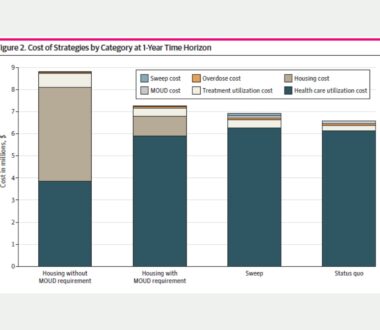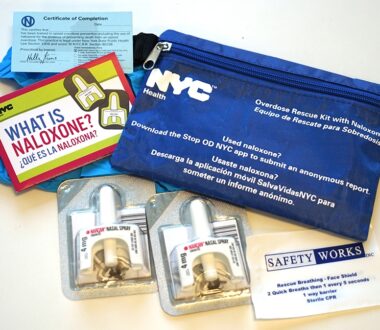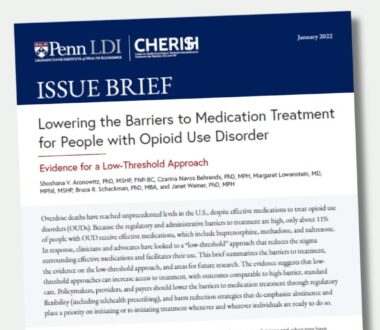
Health and Economic Outcomes of Addressing Encampments of Individuals Using Opioids
Lead author Hana Zwick, a research data analyst at the Syndemics Lab, and colleagues published a new simulation modeling study in JAMA Network Open to understand the public health and economic outcomes of strategies that arrest, disperse, or house people who live in encampments and experience high-risk opioid use compared to the encampment status quo. […]

Research Highlights Prevention Efforts in Fentanyl Overdoses
The overwhelming majority of those in New York City who obtained a naloxone kit to counteract opioid overdose had a high need for the drug, according to a new study by Weill Cornell Medicine investigators and the New York City Department of Health and Mental Hygiene. The study, published Jan. 16 in the Journal of Urban Health, […]

Offering Buprenorphine in Homeless Shelters in Massachusetts Projects Life- and Cost-saving Results
Overdose is the leading cause of death among people with opioid use disorder (OUD) who are experiencing homelessness. Innovative care models that meet this population outside of office-based settings can improve access to buprenorphine, a medication for treating OUD, and avert fatal overdoses. In this study, Avik Chatterjee, lead author and addiction specialist at Boston […]

Economic Evaluations of Establishing Opioid Overdose Prevention Centers in 12 North American Cities: A Systematic Review
In this systematic literature review published in Value in Health, CHERISH Research Affiliates Czarina Behrends and Ahmed Bayoumi, CHERISH staff members Jared Leff, Jazmine Li, and Erminia Fardone, CHERISH investigators Kathryn McCollister, Sean M. Murphy, and Bruce Schackman, and former NIDA summer intern, Weston Lowry, analyzed 16 studies that summarized and identified gaps of economic […]

Sharing Your Research for Maximum Impact
In today’s digital and media landscape, there are several ways to disseminate your health economics research after its publication. From our experience, writing social media, news posts, and policy briefs has allowed us to convey study findings from different angles, reach new audiences, and inform key decision makers. As you are preparing your next journal […]

Intern Spotlight: Valeria Arango, Benicio Beatty, Ameya Komaragiri, Carlos Ponce de Leon Mendez, and Ella Salim
During the peak hour of a July summer day, CHERISH colleagues and interns from Boston Medical Center logged onto Zoom while investigators and staff in New York City filled a conference room located on the Upper East Side at Weill Cornell Medicine. Three minutes past twelve, Caroline Savitsky, program manager in the Section of Infectious […]

Economic benefits of substance use disorder treatment: A systematic literature review of economic evaluation studies from 2003 to 2021
The economic burden of substance use disorder (SUD) is significant. It encompasses clinical and societal costs such as health care and social services, criminal justice resources, loss of productivity, and premature mortality, and is estimated to cost more than $700 billion per year in the United States. To understand the gravity of these economic costs, […]

Engaging with People with Lived Experiences in OUD Modeling Research
Drug overdose deaths continue to rise in the United States and Canada, with the risks for greater opioid use sharply increasing in Mexico. As modelers, we know simulation modeling is a valuable tool that can inform policies and interventions to prevent overdose deaths and reduce related harms including drug overdose, HIV, and hepatitis C virus […]

Lowering the Barriers to Medication Treatment for People with Opioid Use Disorder
Overdose deaths have reached unprecedented levels in the U.S., despite effective medications to treat opioid use disorders (OUDs). Because the regulatory and administrative barriers to treatment are high, only about 11% of people with OUD receive effective medications, which include buprenorphine, methadone, and naltrexone. In response, clinicians and advocates have looked to a “low-threshold” approach […]

Weighing the Costs and Benefits of Initiating Extended-release Injectable Naltrexone Compared to Buprenorphine-naloxone
Naltrexone and buprenorphine are two effective medications for opioid use disorder (OUD). Naltrexone, which is typically given as a monthly extended-release injection (XR-NTX), and daily oral buprenorphine, which is typically combined with naloxone (BUP-NX), are prescribed in outpatient or office-based medical settings. XR-NTX patients, however, need to complete detoxification before starting treatment. Results from a […]

Robust Prescription Monitoring Programs and Abrupt Discontinuation of Long-term Opioid Use
Prescription drug monitoring programs (PDMPs) are statewide databases that track controlled substances dispensed at retail pharmacies. Used by health care providers, public health officials, and other stakeholders, PDMPs have become a major tool in addressing unsafe opioid prescriptions. Robust features of PDMPs—including mandates that allow prescriber use of PDMP, data-sharing across states, and prescriber delegation of […]

Hepatitis C Treatment by Non-specialist Providers in the Direct-acting Antiviral Era
Direct-acting antiviral agents (DAAs), highly effective treatments for hepatitis C virus infection (HCV), transformed HCV therapy and made it easier for non-specialist providers to prescribe HCV treatment. Despite this simplification, many insurers include being a specialist as part of prior authorization requirements for DAA treatment. CHERISH Research Affiliate and former pilot grant recipient Shashi N. […]
Engage with CHERISH
Submit a Consultation Request or Contact Us to learn more about how CHERISH can support your research or policy goals.